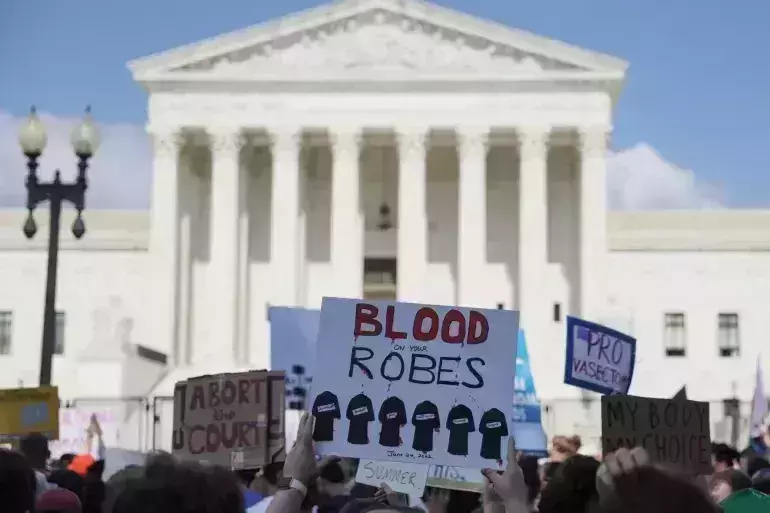
UNHR, WHO, UN Women condemn US Supreme court abortion ruling
text_fieldsUS Supreme Court.
Brussels: International bodies like United Nations Human Rights, World Health Organisation, UN Women etc., have condemned the United States Supreme Court's ruling against abortions, striking down the 50-year-old Roe v Wade judgement that guaranteed access to abortion across the country, PTI reported.
The US Supreme Court's historic ruling on Friday has deconstructed the 50-year-old Roe v Wade judgement, which guaranteed women access to abortion across the country. This means that all questions of legality and access to abortion will depend on individual states in America, where some states have passed abortion bans immediately after the verdict.
The United Nations High Commissioner for Human Rights, Michelle Bachelet, said that the verdict was a "huge blow" to women's human rights and gender equality, as UN agencies warned that restricting access to abortion does not prevent people from seeking it but simply makes it "more deadly".
Bachelet said, "The US Supreme Court ruling on Dobbs v. Jackson Women's Health Organization delivered today represents a major setback after five decades of protection for sexual and reproductive health and rights in the US through Roe v Wade. It is a huge blow to women's human rights and gender equality.
"The ruling has stripped of millions of US women's autonomy to access safe, legal and effective abortion as well as make their own choices about their bodies and lives, free of discrimination, violence and coercion. She argued that effective abortion is firmly rooted in international human rights law. She said that it also invalidates such autonomy of women "belonging to racial and ethnic minorities, to the detriment of their fundamental rights." She added, "More than 50 countries with previously restrictive laws have liberalised their abortion legislation over the past 25 years. With today's ruling, the US is regrettably moving away from this progressive trend."
Meanwhile, the World Health Organisation (WHO) said that more than 25 million unsafe abortions take place and up to 37,000 women die every year, warning that restricting access to abortion does not reduce the number of abortions but leads women and girls to unsafe procedures. WHO said, "Safe abortion care is essential to protect the health of women and girls everywhere. Removing access to #abortion care will put more women & girls at risk of illegal abortions and the consequent safety issues that would bring."
UN women empowerment body, UN Women, reacted to the judgement in a statement that reproductive rights are integral to women's rights which is also upheld by international agreements as well as reflected by laws in various parts of the globe. The body said, "To be able to exercise their human rights and make essential decisions, women need to be able to decide freely and responsibly on the number and spacing of their children and to have access to information, education, and services." It added that it repeated WHO's warning that the ruling will lead women to resort to unsafe practices. It said, "The ability of women to control what happens to their own bodies is also associated with the roles women are able to play in society, whether as a member of the family, the workforce, or government."
"The UN Women remains steadfast in our determination to ensure that the rights of women and girls are fully observed and enjoyed worldwide, and we look forward to continued evidence-based engagement with our partners everywhere in support of rapid progress towards universal enjoyment of universal rights," it added.
The United Nations Population Fund (UNFPA) said that nearly half of all global pregnancies are unintended, and 60 per cent of them ends up in abortion. Citing its 2022 State of the World Population Report, UNFPA said, "A staggering 45 per cent of all abortions around the world are unsafe, making this a leading cause of maternal death. Almost all unsafe abortions currently occur in developing countries, and UNFPA fears that more unsafe abortions will occur around the world if access to abortion becomes more restricted. Decisions reversing progress gained to have a wider impact on the rights and choices of women and adolescents everywhere."
"Whether abortion is legal or not, it happens all too often. Data show that restricting access to abortion does not prevent people from seeking an abortion, it simply makes it more deadly," it added.
Further, The 1994 Programme of Action of the International Conference on Population and Development (ICPD), signed by the United States, along with 178 other countries, had recognised abortions as deadly and unsafe, urging all countries to provide post-abortion care, irrespective of the legal status of the procedure. It agreed that all must be able to access quality information about their reproductive health and contraceptives. It added that as the United Nations sexual and reproductive health agency and the custodian of the ICPD, UNFPA advocates for the right of all couples and individuals to decide freely and responsibly the number, spacing and timing of their children and to have the information and means to do so.
The UN Sustainable Development Goals, particularly SDG 3 related to maternal health, to which all UN Member States have committed, are at risk of not being met if unsafe abortions continue.






